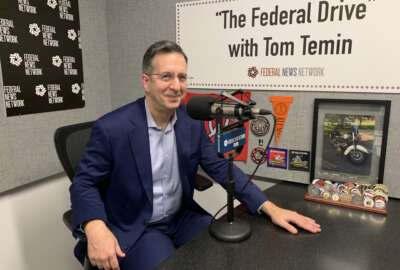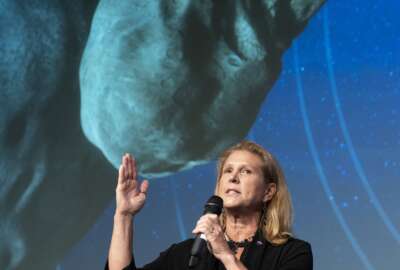This senior executive has the job of ensuring people don’t go hungry
The Agriculture Department's Food and Nutrition Service helps millions of Americans of all ages every year. It operates several programs to help people of all ages...
The Agriculture Department’s Food and Nutrition Service helps millions of Americans of all ages every year. It operates several programs to help people of all ages with something kind of essential. The guest of the Federal Drive with Tom Temin knows the inner-workings of these numerous programs as well as anyone. Now Tameka Owens, the Food and Nutrition Service assistant administrator is a recipient of a Presidential Rank Award.
Interview Transcript:
Tom Temin And I guess it’s maybe not too simple to say that your mission, your agency’s mission is feeding people. Fair way to put it?
Tameka Owens That is absolutely fair.
Tom Temin Tell us more. I mean, tell us what’s involved day to day. I think the [Supplemental Nutrition Assistance Program (SNAP)] program might be the most famous and the biggest of the programs, but it’s just one of about a half a dozen
Tameka Owens Actually, thanks to Congress, we now have 16 nutrition assistance programs. And you’re right, SNAP is probably the most well known. But we also are responsible for the national school lunch program, the school breakfast program. There’s this program called the [Women, Infants and Children Program (WIC)]. We have summer programs. During emergencies, we operate [Disaster Supplemental Nutrition Assistance Program (D-SNAP)], but we also have other emergency feeding programs that provide commodities throughout the year when there’s not an emergency.
Tom Temin And these programs, especially SNAP, have really undergone a lot of modernization in terms of the way they’re delivered over the years, haven’t they?
Tameka Owens Absolutely. During the pandemic, we had to quickly scale the way we provided our services. So we quickly modernized, if you will, in ways that allowed participants to take advantage of online shopping using their SNAP benefits, which was not something that we had previously explored. There were pilots, but nothing full scale. But thanks to the pandemic, we’ve quickly scaled that up. But even with our school lunch and summer programs, those have also undergone modernization and currently, WIC is also undergoing modernization to make sure that from preconception, if you will, that pregnant and postpartum mothers have access to healthy foods and just making sure that folks are aware of what’s available to them, who can access those, whether they’re in-person or virtual.
Tom Temin And my understanding is that these programs of the Food and Nutrition Service has gotten much more sophisticated in the ways it can detect and prevent misuse of these funds. The old classic stories of people buying cigarettes and beer with food stamps, that’s way in the past, pretty much now, isn’t it?
Tameka Owens I would agree with that. We are truly committed to making sure that our programs operate with integrity, and we have really scaled up our operations through the regulatory process, but also the way that we do our management evaluations to make sure that the funds truly are reaching those that are most in need.
Tom Temin And program operators, the managers of the different channels within food and nutrition service. At one time, they would go out to the field and see how things were operating in local stores and food banks and so forth. Does that still happen?
Tameka Owens It does still happen. So our retail, our operations and compliance organization, they are responsible for ensuring that our retailers have proper stock for our participants, but also making sure that they’re operating with integrity. And even during the pandemic when folks were not in close proximity, we continue to evaluate our programs virtually by having those conversations and using platforms such as Zoom and Teams to make sure that programs, we’re still operating with integrity.
Tom Temin And let’s talk about you for a minute. You are a Presidential Rank Award winner, a member of the Senior Executive Service. They don’t make it clear in the public announcement specifically why someone got that rank award. What did they tell you is the reason?
Tameka Owens Well, um, I’ve been at [Food and Nutrition Service (FNS)] since 2012, and throughout my tenure I’ve held a number of positions, not the least of which included moving our headquarters office from a location that we’d been at for 30 years. When I took over the project, it was really behind over budget. I was able to not only get it back within budget, but also close the gap of the delay, which resulted in cost savings to the government. But also my work during the pandemic when there was lots of change that had to happen pretty rapidly given the pandemic and the nature of our programs. And so making sure that the organization was well positioned to continue to provide those critical nutrition assistance programs that individuals need, even during a pandemic.
Tom Temin We’re speaking with Dr. Tameka Owens. She’s assistant administrator of the Food and Nutrition Service at the Agriculture Department and a recent recipient of a presidential rank award. Maybe detail a couple of the big changes that had to happen when people were afraid to go to stores or encounter one another in person. And all of this.
Tameka Owens With our SNAP program, we had to quickly transition from folks being able to retain their benefits at stores to being able to use online purchasing, but also for our school lunch program. Typically, folks are consuming those in the cafeteria and when schools went to virtual, children still need access to that nutrition that they were getting. And as part of that, schools quickly had to pivot and we had to help them pivot, but also to operate within the regulatory confines. And so we quickly make those transitions. And with WIC folks have a requirement to go in, in person to be seen by states and the providers in the clinics. And we quickly transitioned to virtual way so that individuals still had access to their nutrition that our programs provided. So those are some of their transitions. But we quickly scaled up what we were doing to make sure that folks still have access to nutritious food.
Tom Temin Yeah, I recall that switch in SNAP for the online purchase authorization. Did that require simply a technological update, or did you also have to have a regulatory change?
Tameka Owens So it’s a combination of the two. And prior to the pandemic we had some pilot authority, but obviously the pandemic sped things up quite a bit. And so we expanded that pilot. And as of this year, there’s millions of SNAP participants who are able to redeem their benefits, just like any other American is able to shop online and use their benefits in the same way. So there’s some system changes, there some regulatory changes, but there’s also some behavior changes. And just that knowledge and awareness that is available to our participants.
Tom Temin And tell us more about yourself. You said you’ve been at the Food and Nutrition Service for about a dozen years or so, but your career is longer than that.
Tameka Owens It is. So I am an active duty spouse. My husband served in the Army, and so we moved around quite a bit. And the federal government has been very good to me in that I’ve been able to find positions that mess with my skills. I have been worked on at Fort Bliss installation as a health promotion officer. I’ve worked at local health departments, that’s actually my first entree into the world of WIC, because at the health department, that was part of my portfolio. At Food and Nutrition Service, I’ve actually been in the research side of the house, but also our strategic planning part of the house, and I’ve served as its chief operating officer before taking on my current role.
Tom Temin So even if your husband got transferred to Hawaii in the modern, remote and telework era, you could still be a senior executive but assistant administrator at a major program from far away, or could you.
Tameka Owens Well, it depends. I mean, the nature of being a senior executive means that you are physically present most of the time, but there are definitely opportunities to leverage skills across the federal government in this new environment.
Tom Temin Tell us more about the journey of a woman of color in reaching senior executive service, because that’s been an issue the government has been grappling with for 30 or 40 years I’ve been following it.
Tameka Owens Yes. It’s been an interesting journey for myself. I’ve been a member of a senior executive service officially since 2019, and I was given the opportunity in 2018 to serve in an active capacity. And I totally did not see that coming. And you point to being a woman of color, and it was an interesting journey, and it has been one that I think at Food and Nutrition Service, I’ve been given the opportunity and the support of my colleagues has been tremendous. From the secretary all the way down, everyone’s been very supportive and just very receptive to what I bring to the table as a woman of color and respecting that perspective.
Tom Temin It sounds like you would recommend federal civil service then as a career?
Tameka Owens I would. Obviously, you’re not in it for the money, you are in it because you have a passion for helping others. And I absolutely would recommend federal service, particularly the Food and Nutrition Service.
Tom Temin Sounds like you and your husband and the whole family kind of have a service oriented view of the world.
Tameka Owens We absolutely do. That is something that we definitely instill in our two boys. That service is our primary role on this are.
Copyright © 2024 Federal News Network. All rights reserved. This website is not intended for users located within the European Economic Area.
Tom Temin is host of the Federal Drive and has been providing insight on federal technology and management issues for more than 30 years.
Follow @tteminWFED






